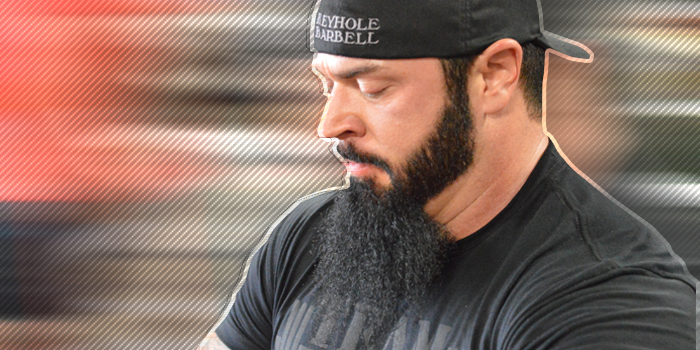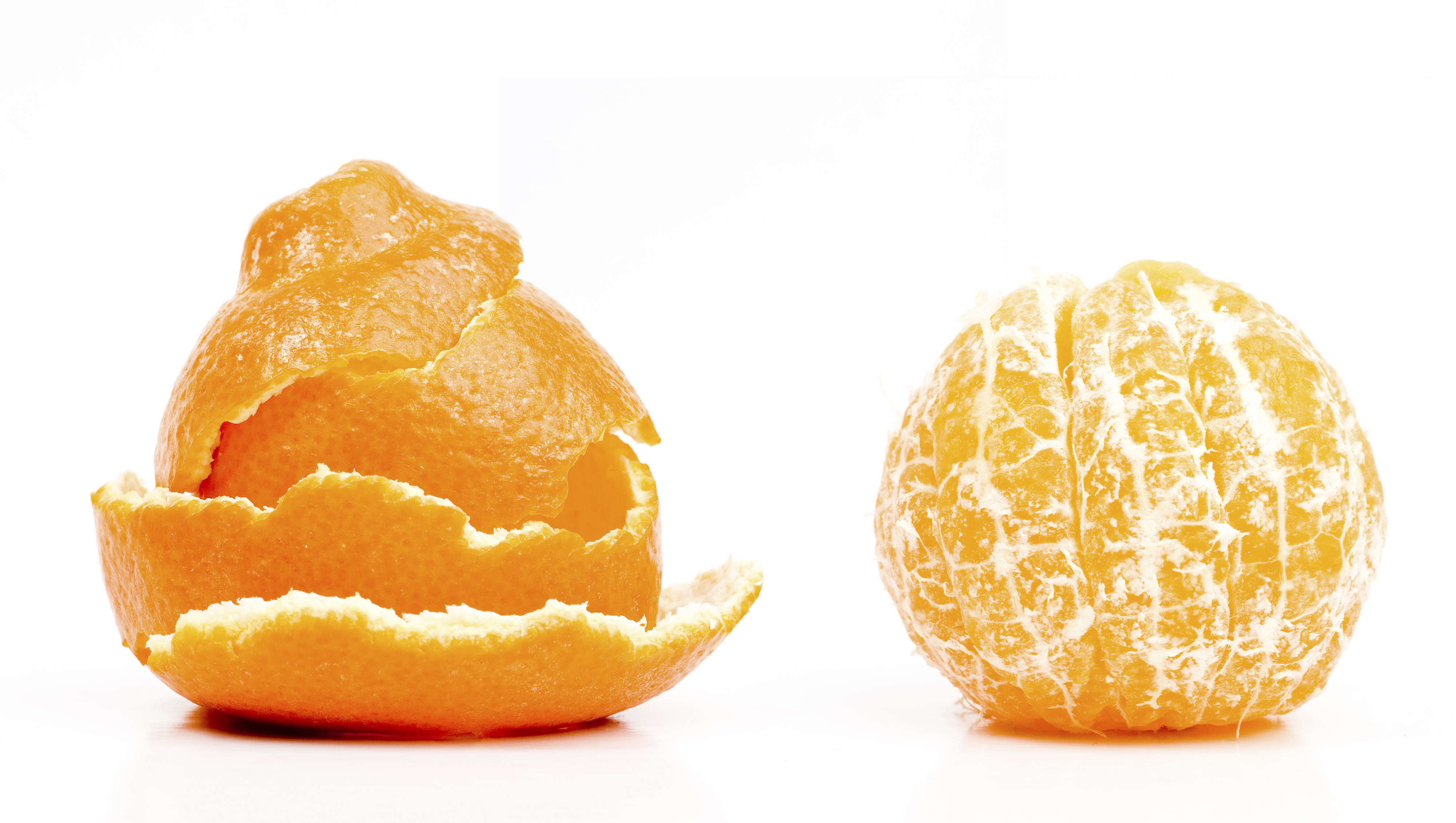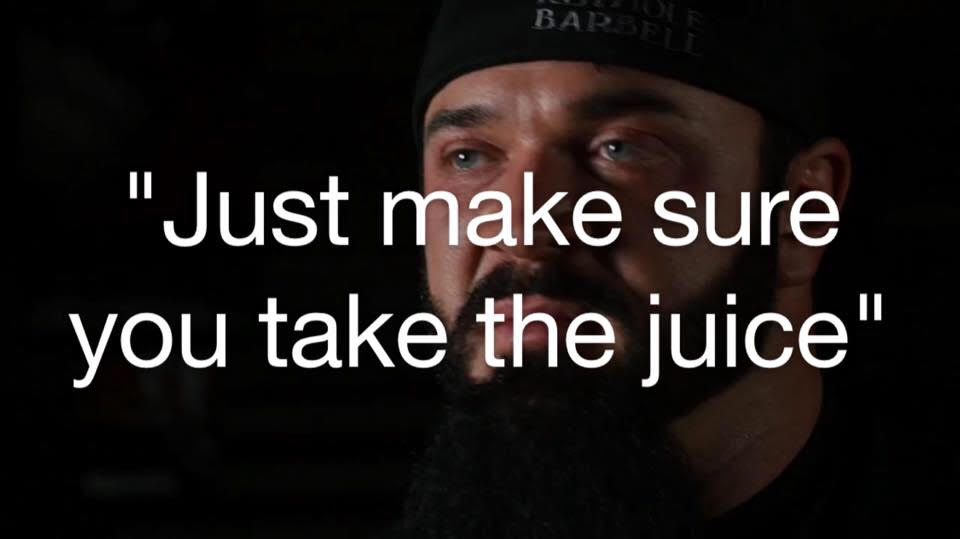
Humans are curious creatures by nature. Powerlifting humans are probably the finest example next to the proverbial cat of how excessive curiosity can blow up in your fucking face. When we see an exceptional lifter, it's almost a reflex of human nature to seek out what they are doing differently from everyone else. This causes a chain reaction of program hopping to whatever the latest phenom suggests.
You see, we want to believe in our hearts that there is some secret we are missing, that there is some special training technique or dosing protocol that's making homeboy's deadlift take off into the stratosphere. If we can just pinpoint the one unique aspect of how he does things, the secret to his success, we could be next.
I'm going to shine the spotlight toward another glaring speed bump on the road to success in powerlifting: taking the rind, leaving the juice. I'm talking about focusing on the wrong things.
Rather than trying to figure out what is different about a certain top lifter's method of training, your aim should always be to seek out similarities between the training of a variety of great lifters. If you want to be one of the best, you would do a lot better to find out what most of the best have in common. This is a good indicator that what they are doing is going to work for you.
I mentioned in a previous article about the road to hell being paved with good intentions. This whole "Mistakes 101" series is just an endlessly unfolding tedium of well-meaning actions that result in irony.
Borrowing trivialities or outright bad ideas from gifted athletes is just another example of that. Finding someone who is really good at lifting and mimicking what they do seems like a really good idea, and it can be, if you pick the right person. 
I talk a lot about becoming a discerner. What I mean by that is developing the skill to discern between the things lifters do which are trivial, and the things that are actually making them better.
This brings to mind an example Jordan Houser brought up when we discussed this subject: You can sit and watch, and study a bird, in an attempt to learn how to fly, but it's important to recognize that although the bird may walk in really strange manner, doing so yourself will not help with the flying. If you walk like a bird, it won't make you able to fly.
There are many living things with feet. Some of them can fly. But of the things that fly, how many don't have wings?
That's the kind of critical thinking which will help you become a discerner. For the business of flying, it seems like the wings are what is necessary.
The same goes for training. When it comes to separating that meat from the bone—identifying the wings and the feet—there is no suitable replacement for experience.
One of the first things you will notice is that almost every good lifter, whether they realize it or not, operates within the guidelines of Prilepin's table for their strength work. If you run anything from 5thSet to the Conjugate Method, this is true for you, as well.
I will go as far as to say this: if someone hands you a program and the volume in a given percentage range for strength training doesn't jive with Prilepin, turn around and walk away from that person. They have no business doing your programming, and that is completely irrespective of their level of talent as an athlete.
Now, before you start with "but so-and-so is the best lifter I know," or "he trains lifter-x (who was already good) and he/she is good," shut up and read the sentence right before this one again.
The exception does not disprove the rule. I, too, have seen the rare, amazingly talented lifter consistently train to the tune of 200% of the recommended volume of the Prilepin table and make progress. It's important to recognize that some people are able to improve in spite of the stupid shit they do, not because of it. I have a 220-pound lifter who runs a 4.3-second 40, and walks around at about 7-percent body fat. He also lives on candy bars and V8 most of the time. You doing that shit is not going to improve your 40 or your body composition.
Talent in lifting or athletics is no indicator of understanding in terms of intelligent training, nor is it any accurate gauge of coaching ability. In fact, I've seen many very talented lifters perform at a top level for only a few years and then begin to quickly decline, in a live action demonstration of what I'm talking about here. They burn out from illogical training and no one can help them, because they are cocky, and already know everything.
What is worse is when these guys cultivate a following and pass on their bullshit, made up training programs to other lifters. I digress.
These lifters do somehow manage to make it to the top in the first place, though. How does that work?
The largest factor in athletic ability is genetically predisposed talent for a given activity. Keep in mind that WHAT they are doing, in their case, may be outweighed by their genetics and HOW they are doing it.
I always say you have something to learn from anyone who is better than you. You'll also hear me say to take the meat and spit out the bone in every situation, though. The meat you can take from their example is that hard work goes a long way. Remember to leave the bone (the stupid training).
When I was younger I had a 600-pound raw bencher tell me that it was a good idea to try and work up to doing 200 push-ups per day, and that if I could do that my bench would go up. This seemed like a pretty stupid idea, but he was a lot stronger and more experienced than me, at the time, so I did it.
I did all my normal training and slowly worked up to 200 push-ups per day over a period of a couple of months. Now, doing 1400 push-ups per week didn't do a goddamned thing for my bench press, but it hurt like hell. It got to the point that I couldn't raise my arms over my head.
If I was a little more experienced, even if I didn't have the understanding of training principles that I do, what I might've asked myself would've been: what did some other guys at that level do?
Did Vincent Dizenzo do a whole shit load of push-ups when he was training to bench six hundred?
How about Jeremy Hoornstra, does he have a mean calisthenics game? No?
Brandon Lilly? No?
Is the guy giving me advice the only strong bencher who does this stupid shit? Yes.
Maybe it's not the best idea.
The moral of the story is this: some people are really strong and still complete ass clowns.
Aside from parents with a favorable genetic profile, the only thing some of these guys have going for them is diligence. This brings me back to where we started. If we step outside of "method of training" for a minute, what is one common trait that all the best lifters share?
Allow me to point out one categorical quality, shared by every true champion: perseverance in carrying out action.
They all put in work. Day in and day out, consistently, for many years on end. These motherfuckers toil and remain obstinate, in every respect, to get where they are. Every one of them. Genetics aside, no one gets to the top without working their ass off.
The fact that someone is an idiot doesn't mean that you have nothing to learn from them. It bears repeating that you may have something to learn from every decent lifter you meet. Just make sure you take the juice and leave the rind.
(I'm not talking about steroids. I can see that as a meme on the Internet, already, taken entirely out of context. "Just make sure you take the juice...")












1. Instead of wasting energy warming up, drink a glass of cognac. It works the same and improves your performance
2. Drinking a bit more than that before a meet
3. "Beer is the best muscle relaxant" (in large quantities)
4. Drink soap water (yes, dilute soap in water) before lifting - it will eliminate fat soluble toxins
5. Don't warmup: do "cold lifts" (don't touch the bar and lift a 90% load) - awesome CNS stimulus
Some of them are still alive...
Love this.
Great read. Thanks.